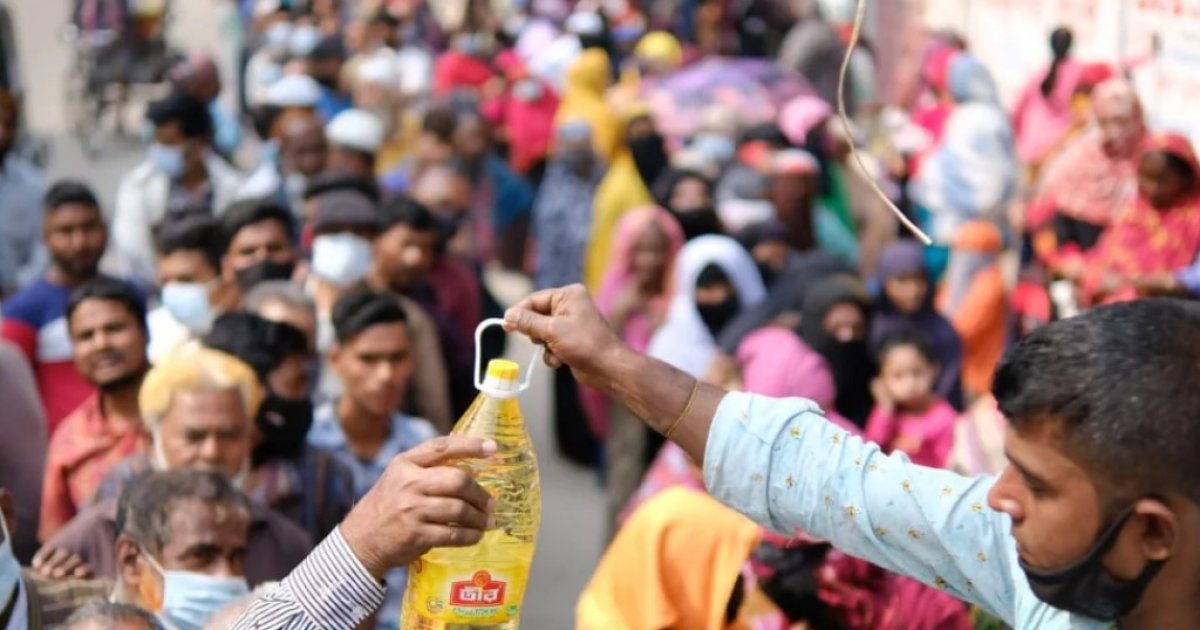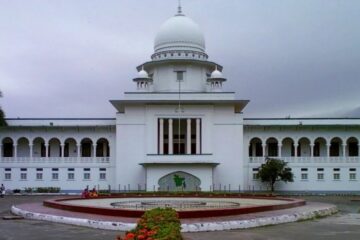Bangladesh’s economy is facing sustained strain, with household budgets stretched to the limit and purchasing power steadily eroding.
For 44 consecutive months, wage growth has failed to keep pace with inflation, leaving millions of low and middle-income families struggling to meet basic needs.
Daily essentials such as food, rent, and transportation have become increasingly unaffordable.
With incomes stagnant, families are dipping into their savings to cover basic costs, further weakening their financial resilience.
According to the latest data from the Bangladesh Bureau of Statistics (BBS), average wages in September rose by 8.02%, while inflation stood at 8.36%.
This marks the third consecutive month of slowing wage growth—8.19% in July, 8.15% in August, and 8.02% in September—eroding real incomes even further.
Economists describe this as a “silent crisis” gripping the labour market.
Former World Bank Dhaka office chief economist Dr Zahid Hossain said workers are “being hit from both sides”—rising prices and slowing wage growth.
“It’s like being struck in the head and feet at the same time,” he said, noting that wage growth fell across all divisions in September, with Khulna seeing the sharpest drop of 0.18 percentage points.
Dr Hossain warned that the real income crisis will persist unless inflation is controlled or productivity improves.
Jahangirnagar University economics professor Dr Mohammad Lutfor Rahman added that the slowdown reflects “deeper weakness in the economy.”
Investment and employment have both fallen, he said, while political uncertainty has compounded the problem.
Purchasing power continues to decline
Inflation rose to 8.36% in September 2025, with the prices of rice, pulses, edible oil, vegetables, medicines, and rent all climbing. While nominal wages have increased slightly, they remain far below the rise in expenses.
Families are increasingly resorting to borrowing, skipping medical treatment, or cutting nutritious food to make ends meet.
Economists warn that persistent high inflation will dampen consumer spending and could trigger a broader economic slowdown unless supply chain disruptions ease and market monitoring improves.
According to the UN Food and Agriculture Organization (FAO), 23.6 million Bangladeshis were suffering from acute food insecurity by the end of 2024—7 million more than a year earlier.
Essential costs for food, housing, transport, medicine, and education have continued to climb for three years, leaving fixed-income and retired individuals particularly vulnerable.
Growth slows, investment stalls
BBS estimates GDP growth at 3.69% in the last fiscal year, the lowest in five years.
The International Monetary Fund (IMF) has cut its projection for FY26 to 4.9% from 5.4%.
Private sector credit growth—an indicator of business activity—slumped to 6.35% in August, the lowest in 22 years.
Entrepreneurs cite high interest rates, liquidity shortages, and weak demand as key challenges.
Dhaka Chamber of Commerce and Industry President Taskin Ahmed said: “High interest rates and uncertainty are discouraging entrepreneurs. We hope investment will revive once stability returns after the elections.”
Foreign investment dips
New foreign investment plunged by nearly 62% in the April–June quarter of 2025, falling to $81 million from $214 million a year earlier.
The only silver lining: reinvestment by existing foreign firms rose to $258 million, suggesting companies are maintaining operations rather than expanding.
Former BIBM Director General Toufique Ahmed Chowdhury said: “The investment climate is not conducive. Both foreign and domestic investors are waiting for stability before making new commitments.”
Weak job market, depleted savings
Unemployment stands at 4.63%, or roughly 2.7 million active jobseekers, according to the BBS. Every sixth young person is unemployed.
The International Labour Organization (ILO) reports that job creation has nearly stalled due to slower exports and investment.
Economists warn that prolonged youth joblessness could worsen social tensions.
High inflation has also depleted household savings.
Sales of government savings certificates fell 88% year-on-year to Tk289 crore in August 2025.
With families liquidating assets to cover expenses, both individual financial security and government financing options are under pressure.
Exports lose momentum
Exports have declined for two consecutive months, falling 3% in August and 4.61% in September, according to the Export Promotion Bureau.
Ready-made garments, home textiles, agricultural goods, and jute products all recorded declines.
Analysts attribute this to weakening demand in Europe, tariff pressures in the United States, and rising import costs for raw materials.
Economy under multidimensional strain
Bangladesh is navigating a “pressure zone” marked by political uncertainty, high interest rates, energy shortages, expensive imports, and fiscal strain.
Industrial output and construction have slowed, and weak credit growth reflects subdued business confidence.
Economists warn that the combination of falling investment, rising joblessness, and eroding purchasing power risks creating a vicious cycle—where weaker demand further depresses production and employment, deepening inequality.
Policy actions needed
Experts call for a coordinated policy response to stabilize prices, boost productivity, and restore confidence.
They recommend expanding food assistance and cash transfers for low-income families, improving supply chains, and ensuring political stability to reignite investment.
Professor Lutfor Rahman said: “If a stable government is formed after the elections, investment and employment will rise, and wages will gradually recover. Until then, the government should strengthen OMS and rationing programs to provide relief to workers.”
Without effective inflation control, real economic recovery for most Bangladeshis will remain elusive.



